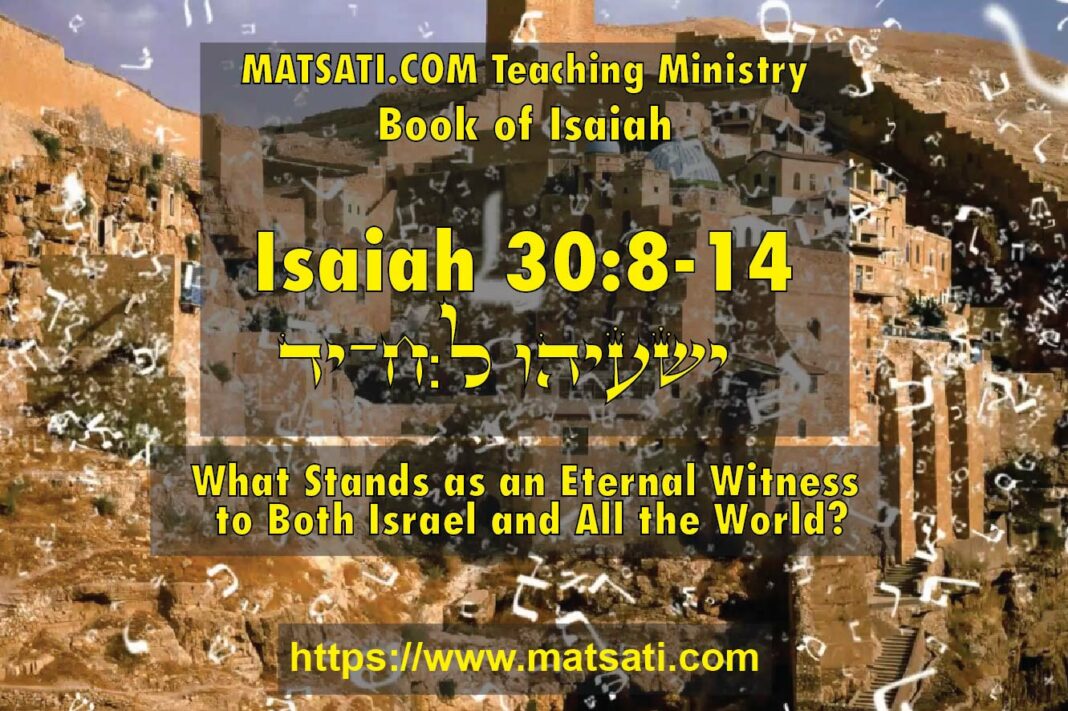Isaiah 30:8-14
Fundamentally speaking, the origin of trusting in something that is other than God is due to a lack of faith. Here Isaiah begins to discuss the issue Judah and Jerusalem have concerning their lack of faith. The central aspect of this is how people tend to want to trust in their own actions as opposed to waiting on the Lord God Almighty to work. This is something Yeshua encountered during his ministry here on Earth. The response of the religious leaders was that their obedience to the Torah gained them entrance into heaven. (Luke 6:6-11) The point Yeshua was making was that obedience comes as a function of faith, and not the other way around. The common anomian theologies that are being taught today make the claim that one entered into heaven through works of obedience to the Torah: to the commandments (Shemot / Exodus 24:1-8, Vayikra / Leviticus 18:5, Devarim / Deuteronomy 27:26) and by the making of sacrifices (Vayikra / Leviticus 1:1-4, 4:27-35). What is absent from the theological reasoning is that salvation is a matter of being in a covenant with God which originates with faith. In addition, the one who lives by faith will then walk according to God’s holy words, otherwise one does not have true faith, just as the apostle James wrote according to James 2:14-26.
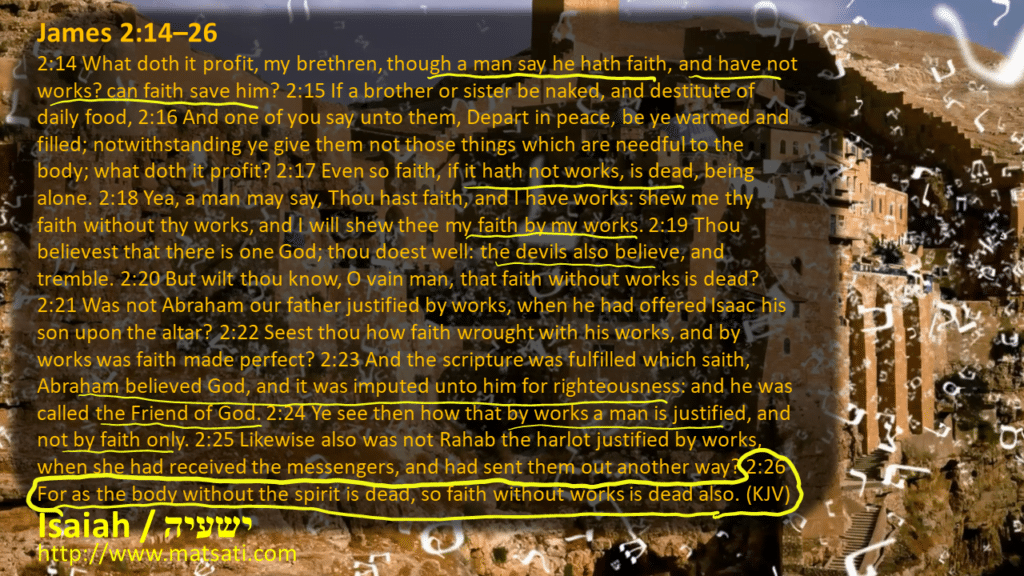
James 2:14–26
2:14 What doth it profit, my brethren, though a man say he hath faith, and have not works? can faith save him? 2:15 If a brother or sister be naked, and destitute of daily food, 2:16 And one of you say unto them, Depart in peace, be ye warmed and filled; notwithstanding ye give them not those things which are needful to the body; what doth it profit? 2:17 Even so faith, if it hath not works, is dead, being alone. 2:18 Yea, a man may say, Thou hast faith, and I have works: shew me thy faith without thy works, and I will shew thee my faith by my works. 2:19 Thou believest that there is one God; thou doest well: the devils also believe, and tremble. 2:20 But wilt thou know, O vain man, that faith without works is dead? 2:21 Was not Abraham our father justified by works, when he had offered Isaac his son upon the altar? 2:22 Seest thou how faith wrought with his works, and by works was faith made perfect? 2:23 And the scripture was fulfilled which saith, Abraham believed God, and it was imputed unto him for righteousness: and he was called the Friend of God. 2:24 Ye see then how that by works a man is justified, and not by faith only. 2:25 Likewise also was not Rahab the harlot justified by works, when she had received the messengers, and had sent them out another way? 2:26 For as the body without the spirit is dead, so faith without works is dead also. (KJV, *14 Τί °τὸ ὄφελος,* ἀδελφοί μου, ἐὰν πίστιν ⸂λέγῃ τις⸃ ἔχειν, ἔργα δὲ μὴ ⸀ἔχῃ; μὴ δύναται ἡ πίστις σῶσαι αὐτόν; 15 ἐὰν ⸆ ἀδελφὸς ἢ ἀδελφὴ γυμνοὶ ὑπάρχωσιν* ⸀καὶ λειπόμενοι °ὦσιν τῆς ἐφημέρου τροφῆς,* 16 ⸂εἴπῃ δέ⸃ τις αὐτοῖς ἐξ ὑμῶν· ὑπάγετε ἐν εἰρήνῃ, θερμαίνεσθε καὶ χορτάζεσθε, μὴ δῶτε δὲ αὐτοῖς τὰ ἐπιτήδεια τοῦ σώματος, τί °τὸ ὄφελος; 17 οὕτως καὶ ἡ πίστις,* ἐὰν μὴ ⸂ἔχῃ ἔργα⸃, νεκρά ἐστιν καθʼ ἑαυτήν. 18 Ἀλλʼ ἐρεῖ τις· σὺ πίστιν ἔχεις, κἀγὼ ἔργα ἔχω. δεῖξόν μοι τὴν πίστιν °σου ⸀χωρὶς τῶν ἔργων⸆, κἀγώ ⸉σοι δείξω⸊ ἐκ τῶν ἔργων μου τὴν πίστιν⸇.* 19 σὺ πιστεύεις ὅτι ⸂εἷς ἐστιν ὁ θεός⸃,* καλῶς ποιεῖς· καὶ τὰ δαιμόνια πιστεύουσιν καὶ φρίσσουσιν. 20 Θέλεις δὲ γνῶναι, ὦ ἄνθρωπε κενέ, ὅτι ἡ πίστις χωρὶς τῶν ἔργων ⸀ἀργή ἐστιν;* 21 Ἀβραὰμ ὁ πατὴρ ἡμῶν οὐκ ἐξ ἔργων ἐδικαιώθη ἀνενέγκας Ἰσαὰκ τὸν υἱὸν αὐτοῦ ἐπὶ τὸ θυσιαστήριον;* 22 βλέπεις ὅτι ἡ πίστις ⸀συνήργει τοῖς ἔργοις αὐτοῦ καὶ ἐκ τῶν ἔργων ⸆ ἡ πίστις ἐτελειώθη, 23 καὶ ἐπληρώθη ἡ γραφὴ ἡ λέγουσα· ἐπίστευσεν °δὲ Ἀβραὰμ τῷ θεῷ,* καὶ ἐλογίσθη αὐτῷ εἰς δικαιοσύνην καὶ ⸀φίλος θεοῦ ἐκλήθη. 24 ὁρᾶτε ⸆ ὅτι ἐξ ἔργων δικαιοῦται ἄνθρωπος καὶ οὐκ ἐκ πίστεως μόνον. 25 ⸂ὁμοίως δὲ⸃ καὶ Ῥαὰβ ἡ πόρνη οὐκ ἐξ ἔργων ἐδικαιώθη ὑποδεξαμένη τοὺς ⸀ἀγγέλους καὶ ἑτέρᾳ ὁδῷ ἐκβαλοῦσα;* 26 ὥσπερ °γὰρ τὸ σῶμα χωρὶς ⸆ πνεύματος νεκρόν ἐστιν, οὕτως καὶ ἡ πίστις χωρὶς ⸇ ἔργων νεκρά ἐστιν.*)
What James is explaining here in his epistle is the place of Torah in our lives. The idea of putting Torah in front of our faith, is synonymous to legalism, the idea of what Isaiah is proposing the people of Judah and Jerusalem are doing by placing their faith in Egypt as opposed to trusting in God by faith. James is describing how the mitzvot (commandments) come following our faith, how we listen to the voice of God, we love the Lord our God, and so we live our lives according to His mitzvot. This is what it means that “faith without works is dead.” (James 2:18) The anomian theologies today neglect this basic truth and vilify the Torah as the one who walks in God’s commands to be as one who has no faith. In addition to this, the anomian theologies teach that somehow salvation is by faith in Yeshua that is coupled to nothing else, i.e. the fruit of the spirit. We note that a sign of God’s indwelling presence in our lives is after having faith in what Yeshua had done for us, and in our Father in heaven, our lives should be transformed to produce the fruit of the Spirit. (See Galatians 5:22–23, But the fruit of the Spirit is love, joy, peace, longsuffering, gentleness, goodness, faith, Meekness, temperance: against such there is no law. KJV) The fruit of the Spirit are the works of righteousness that Paul lists in his epistle to the Galatians. The presence of God in our lives is to empower us to overcome sin and the definition of not sinning is obedience to God’s commands. We note when Paul and James write using the example of Abraham, they make the point that Abraham lived prior to the giving of the Torah of God. (Bereshit / Genesis 15:1-6, Romans 4:1-5, Galatians 3:6, James 2:23) Abraham is used as an example of one who trusted in God and in His promises to show us how righteousness comes by faith. The Lord God Almighty counts us righteous because of our faith! The point is that when God credits righteousness to us by faith, and by reason of Yeshua sanctifying us in heaven by his blood, we should likewise sanctify ourselves here on earth to turn from sin and to walk in God’s holy ways! This is what it means to place the Torah as a function of our faith in God and His Messiah, and is consistent with what James is writing in his epistle. Paul’s major argument in the book of Romans was not that the Torah was done away with, but that it has a position in our lives that follows our faith, and not prior to our faith. Paul writes in this particular way to illustrate this point according to Romans 3:21.
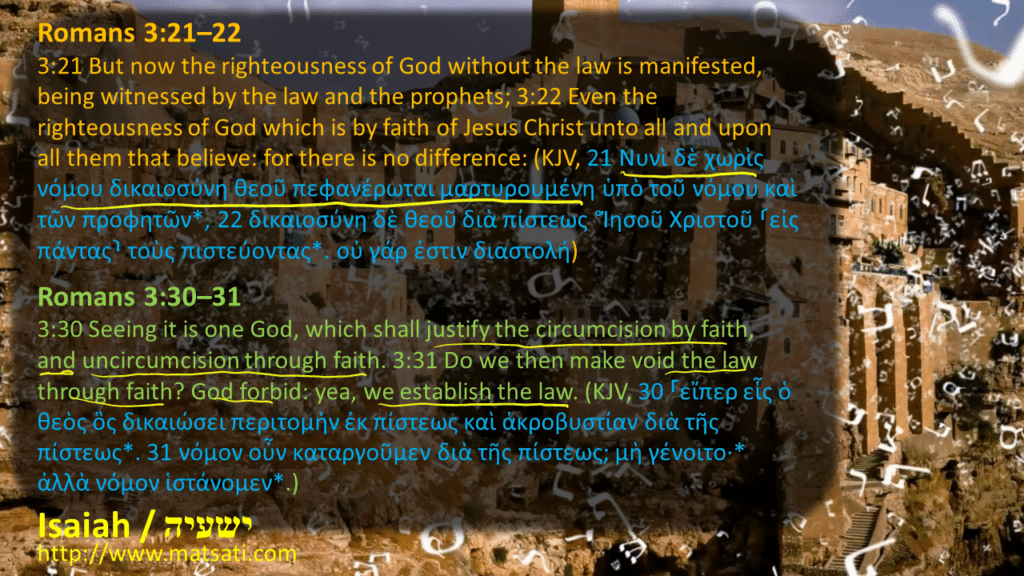
Romans 3:21–22
3:21 But now the righteousness of God without the law is manifested, being witnessed by the law and the prophets; 3:22 Even the righteousness of God which is by faith of Jesus Christ unto all and upon all them that believe: for there is no difference: (KJV, 21 Νυνὶ δὲ χωρὶς νόμου δικαιοσύνη θεοῦ πεφανέρωται μαρτυρουμένη ὑπὸ τοῦ νόμου καὶ τῶν προφητῶν*, 22 δικαιοσύνη δὲ θεοῦ διὰ πίστεως °Ἰησοῦ Χριστοῦ ⸂εἰς πάντας⸃ τοὺς πιστεύοντας*. οὐ γάρ ἐστιν διαστολή)
We note the context here Paul says according to Romans 3:31 that we actually establish the Torah in our lives!
Romans 3:30–31
3:30 Seeing it is one God, which shall justify the circumcision by faith, and uncircumcision through faith. 3:31 Do we then make void the law through faith? God forbid: yea, we establish the law. (KJV, 30 ⸀εἴπερ εἷς ὁ θεὸς ὃς δικαιώσει περιτομὴν ἐκ πίστεως καὶ ἀκροβυστίαν διὰ τῆς πίστεως*. 31 νόμον οὖν καταργοῦμεν διὰ τῆς πίστεως; μὴ γένοιτο·* ἀλλὰ νόμον ἱστάνομεν*.)
What Paul says is that there is a righteousness that is apart from the Torah from the sense that we are accredited righteous by our faith. A literal translation of Paul’s words Νυνὶ δὲ χωρὶς νόμου δικαιοσύνη θεοῦ πεφανέρωται μαρτυρουμένη “Now without the Law righteousness of God made a clear witness” reveals to us how from the very beginning, the Torah was not given as a means for salvation. The point is to accept the Word of God, believing in the promises of God, and trusting in Him for eternal life; these are the components of people who are faithful. In addition to this, we must not forget that being faithful also means that we are living as if we believe God’s word, and not provide lip service, but offering our lives as living sacrifices, just as Paul wrote to the Romans in Romans 12.
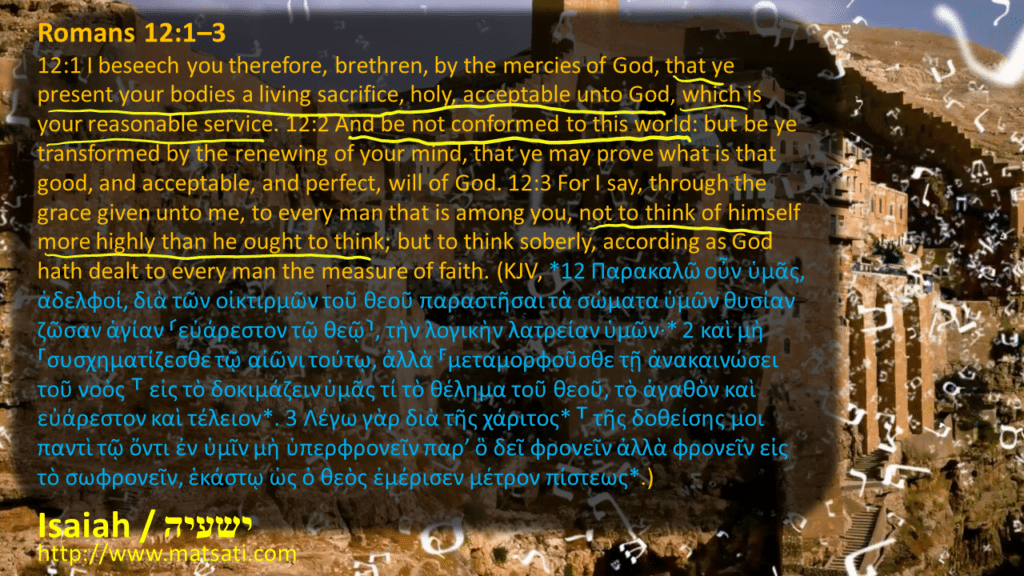
Romans 12:1–3
12:1 I beseech you therefore, brethren, by the mercies of God, that ye present your bodies a living sacrifice, holy, acceptable unto God, which is your reasonable service. 12:2 And be not conformed to this world: but be ye transformed by the renewing of your mind, that ye may prove what is that good, and acceptable, and perfect, will of God. 12:3 For I say, through the grace given unto me, to every man that is among you, not to think of himself more highly than he ought to think; but to think soberly, according as God hath dealt to every man the measure of faith. (KJV, *12 Παρακαλῶ οὖν ὑμᾶς, ἀδελφοί, διὰ τῶν οἰκτιρμῶν τοῦ θεοῦ παραστῆσαι τὰ σώματα ὑμῶν θυσίαν ζῶσαν ἁγίαν ⸂εὐάρεστον τῷ θεῷ⸃, τὴν λογικὴν λατρείαν ὑμῶν·* 2 καὶ μὴ ⸀συσχηματίζεσθε τῷ αἰῶνι τούτῳ, ἀλλὰ ⸁μεταμορφοῦσθε τῇ ἀνακαινώσει τοῦ νοὸς ⸆ εἰς τὸ δοκιμάζειν ὑμᾶς τί τὸ θέλημα τοῦ θεοῦ, τὸ ἀγαθὸν καὶ εὐάρεστον καὶ τέλειον*. 3 Λέγω γὰρ διὰ τῆς χάριτος* ⸆ τῆς δοθείσης μοι παντὶ τῷ ὄντι ἐν ὑμῖν μὴ ὑπερφρονεῖν παρʼ ὃ δεῖ φρονεῖν ἀλλὰ φρονεῖν εἰς τὸ σωφρονεῖν, ἑκάστῳ ὡς ὁ θεὸς ἐμέρισεν μέτρον πίστεως*.)
This idea of offering our bodies as living sacrifices is that of sanctifying our lives through obedience to God’s word. This was the point of the giving of the Torah, that God’s holy people would know how-to live-in righteousness and holiness. There are also some anomian theologians who cause division through their teaching, that obeying God’s Torah is not for us today. The fact of the matter is that when we study the Scriptures, we can see how Yeshua, the Disciples, and Paul were in fact teaching Torah. The point was the position of the Torah where it fit into the life of those who are faithful. Paul can be confusing if we do not carefully dissect his epistles. It is interesting how even a simple survey of Paul’s words, even neglecting the Greek text looking at English only, we can see these truths. Why the anomian theologians miss this is likely due to the fact that we are responsible and accountable before God concerning His word. And the anomian theologians want an easy faith, to provide lip service only without the responsibility and accountability of obeying God’s word to sanctify one’s life! If we think about these things, there is great significance here in relation to our being a faithful people unto God. This was the significance, Yeshua said, “Then I will tell them plainly, ‘I never knew you. Away from me, you evildoers!’” (Matthew 7:23). Why does Yeshua say that he never knew these people? This is exactly what Isaiah has been saying and we have been discussing in our studies. When one chooses to walk away from the counsel of God, from His word, or when one turns from trusting in Him, one chooses to walk a different path. This means that one is actually turning his or her back on God and His holy ways! This means that one is walking away from God and not drawing near to Him! So when one does these things, he or she is not recognized by God as one of His people. This is analogous to claiming to believe in the God of Israel and His Messiah Yeshua, and also walking among and in the way of the nations. God will not recognize such a person! So these things are very serious and of great importance for our lives today! And this is what Isaiah discusses as a fundamental problem in the lives of the people, that they do not trust in the Lord but would rather place their trust in the work of their hands! The reality of these things is what Isaiah is saying, that if they will not hear the words of the prophets, then they will be face to face with the consequences of their unrepentant sin. The good news is that God forgives and seeks for us to turn from our sinful ways. We have to break the pride of life, and humble ourselves to faith in Yeshua and trusting in the promises of God! And not just this, but that we live our lives for Him according to His Torah!
Isaiah continues saying the following according to Isaiah 30:8-9
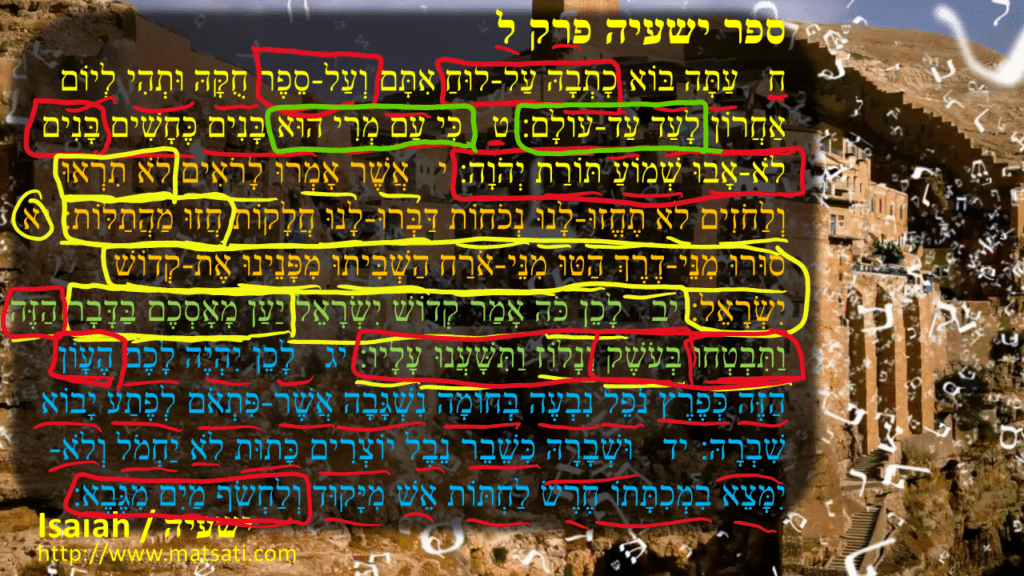
ספר ישעיה פרק ל
ח עַתָּה בּוֹא כָתְבָהּ עַל-לוּחַ אִתָּם וְעַל-סֵפֶר חֻקָּהּ וּתְהִי לְיוֹם אַחֲרוֹן לָעַד עַד-עוֹלָם: ט כִּי עַם מְרִי הוּא בָּנִים כֶּחָשִׁים בָּנִים לֹא-אָבוּ שְׁמוֹעַ תּוֹרַת יְהֹוָה:
Isaiah 30:8 states, “Now go, write it before them in a table, and note it in a book, that it may be for the time to come for ever and ever: (עַתָּה בּוֹא כָתְבָהּ עַל-לוּחַ אִתָּם וְעַל-סֵפֶר חֻקָּהּ וּתְהִי לְיוֹם אַחֲרוֹן לָעַד עַד-עוֹלָם)” Isaiah 30:9 “That this is a rebellious people, lying children, children that will not hear the law of the LORD: (כִּי עַם מְרִי הוּא בָּנִים כֶּחָשִׁים בָּנִים לֹא-אָבוּ שְׁמוֹעַ תּוֹרַת יְהֹוָה)” Here Isaiah speaks about writing upon a table (כָתְבָהּ עַל-לוּחַ) and noting in a book (וְעַל-סֵפֶר חֻקָּהּ) his prophetic message. There is some debate among commentators on what exactly Isaiah is referring to in regard to writing upon a table and book. The point however of what Isaiah is saying is significant because this that is written will stand as an everlasting witness or testimony. (חֻקָּהּ וּתְהִי לְיוֹם אַחֲרוֹן לָעַד עַד-עוֹלָם) When we read the Bible, we get an idea on the significance of these words according to the book of Revelation.
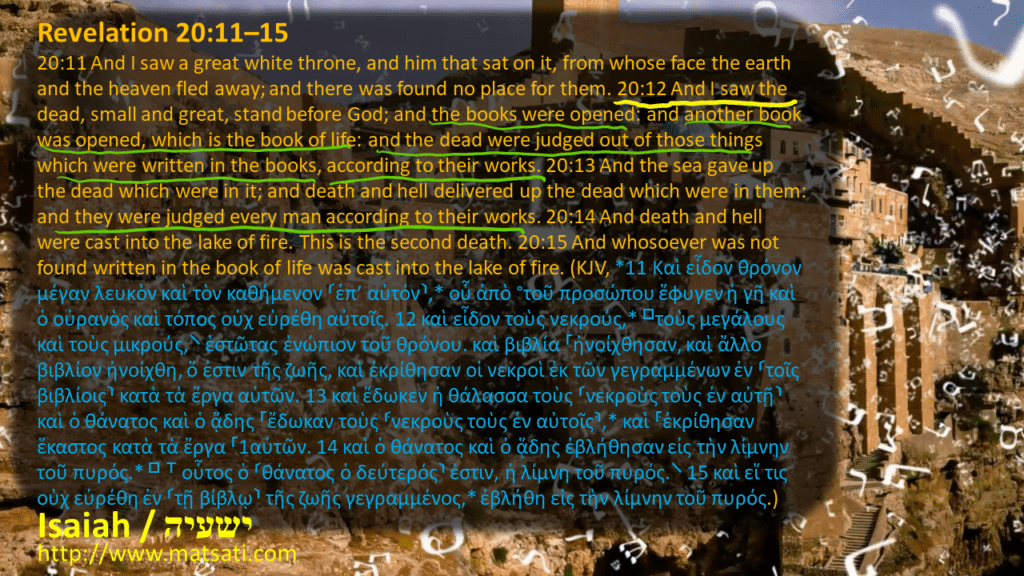
Revelation 20:11–15
20:11 And I saw a great white throne, and him that sat on it, from whose face the earth and the heaven fled away; and there was found no place for them. 20:12 And I saw the dead, small and great, stand before God; and the books were opened: and another book was opened, which is the book of life: and the dead were judged out of those things which were written in the books, according to their works. 20:13 And the sea gave up the dead which were in it; and death and hell delivered up the dead which were in them: and they were judged every man according to their works. 20:14 And death and hell were cast into the lake of fire. This is the second death. 20:15 And whosoever was not found written in the book of life was cast into the lake of fire. (KJV, *11 Καὶ εἶδον θρόνον μέγαν λευκὸν καὶ τὸν καθήμενον ⸂ἐπʼ αὐτόν⸃,* οὗ ἀπὸ °τοῦ προσώπου ἔφυγεν ἡ γῆ καὶ ὁ οὐρανὸς καὶ τόπος οὐχ εὑρέθη αὐτοῖς. 12 καὶ εἶδον τοὺς νεκρούς,* ⸋τοὺς μεγάλους καὶ τοὺς μικρούς,⸌ ἑστῶτας ἐνώπιον τοῦ θρόνου. καὶ βιβλία ⸀ἠνοίχθησαν, καὶ ἄλλο βιβλίον ἠνοίχθη, ὅ ἐστιν τῆς ζωῆς, καὶ ἐκρίθησαν οἱ νεκροὶ ἐκ τῶν γεγραμμένων ἐν ⸂τοῖς βιβλίοις⸃ κατὰ τὰ ἔργα αὐτῶν. 13 καὶ ἔδωκεν ἡ θάλασσα τοὺς ⸂νεκροὺς τοὺς ἐν αὐτῇ⸃ καὶ ὁ θάνατος καὶ ὁ ᾅδης ⸀ἔδωκαν τοὺς ⸄νεκροὺς τοὺς ἐν αὐτοῖς⸅,* καὶ ⸁ἐκρίθησαν ἕκαστος κατὰ τὰ ἔργα ⸀1αὐτῶν. 14 καὶ ὁ θάνατος καὶ ὁ ᾅδης ἐβλήθησαν εἰς τὴν λίμνην τοῦ πυρός.* ⸋ ⸆ οὗτος ὁ ⸂θάνατος ὁ δεύτερός⸃ ἐστιν, ἡ λίμνη τοῦ πυρός.⸌ 15 καὶ εἴ τις οὐχ εὑρέθη ἐν ⸂τῇ βίβλῳ⸃ τῆς ζωῆς γεγραμμένος,* ἐβλήθη εἰς τὴν λίμνην τοῦ πυρός.)
The significant verse is Revelation 20:12 καὶ εἶδον τοὺς νεκρούς,* ⸋τοὺς μεγάλους καὶ τοὺς μικρούς,⸌ ἑστῶτας ἐνώπιον τοῦ θρόνου. καὶ βιβλία ⸀ἠνοίχθησαν, καὶ ἄλλο βιβλίον ἠνοίχθη, ὅ ἐστιν τῆς ζωῆς, καὶ ἐκρίθησαν οἱ νεκροὶ ἐκ τῶν γεγραμμένων ἐν ⸂τοῖς βιβλίοις⸃ κατὰ τὰ ἔργα αὐτῶν. 20:12 And I saw the dead, small and great, stand before God; and the books were opened: and another book was opened, which is the book of life: and the dead were judged out of those things which were written in the books, according to their works. (KJV) Here these are references to the books of the Scriptures, the holy Bible and God’s Torah. The book of life is something to what Moshe referred to in the Torah in Parashat Ki Tisa (see Shemot / Exodus 32:32). We note how taking this interpretation, the Scriptures function as an everlasting testimony (חֻקָּהּ וּתְהִי לְיוֹם אַחֲרוֹן לָעַד עַד-עוֹלָם) just as Isaiah is saying here in Isaiah 30:8. In addition to this, our lives function also as an everlasting testimony to God and to this world of what the Lord God of Israel and His Messiah have done in our lives! This is what is meant when the book of revelation repeats saying:
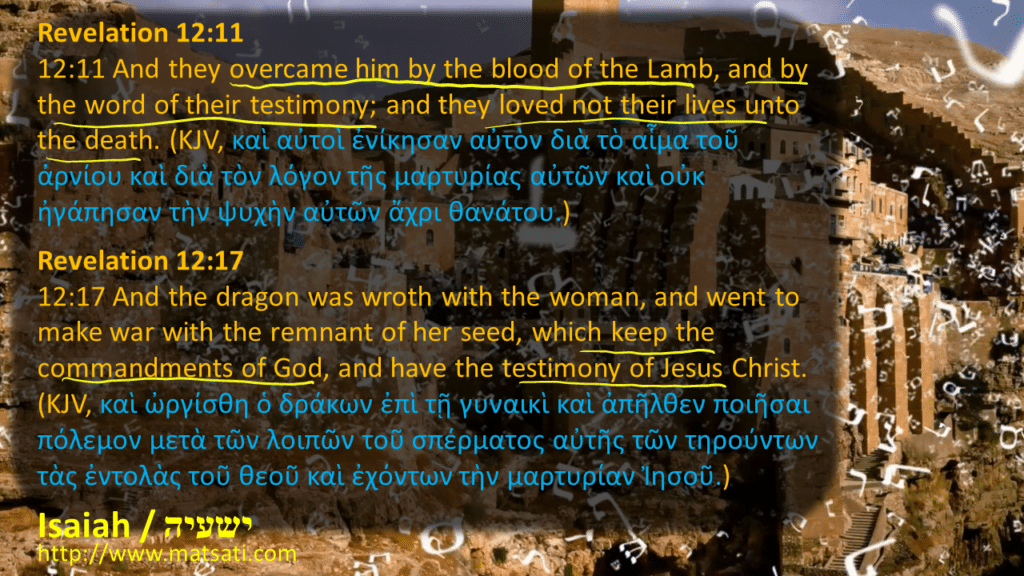
Revelation 12:11
12:11 And they overcame him by the blood of the Lamb, and by the word of their testimony; and they loved not their lives unto the death. (KJV, καὶ αὐτοὶ ἐνίκησαν αὐτὸν διὰ τὸ αἷμα τοῦ ἀρνίου καὶ διὰ τὸν λόγον τῆς μαρτυρίας αὐτῶν καὶ οὐκ ἠγάπησαν τὴν ψυχὴν αὐτῶν ἄχρι θανάτου.)
Revelation 12:17
12:17 And the dragon was wroth with the woman, and went to make war with the remnant of her seed, which keep the commandments of God, and have the testimony of Jesus Christ. (KJV, καὶ ὠργίσθη ὁ δράκων ἐπὶ τῇ γυναικὶ καὶ ἀπῆλθεν ποιῆσαι πόλεμον μετὰ τῶν λοιπῶν τοῦ σπέρματος αὐτῆς τῶν τηρούντων τὰς ἐντολὰς τοῦ θεοῦ καὶ ἐχόντων τὴν μαρτυρίαν Ἰησοῦ.)
These verses speak to those who believe in the Messiah of God and obey God’s commands and note how the way they lived their lives based upon their faith stood as an everlasting testimony! Isaiah 30:9 states explicitly כִּי עַם מְרִי הוּא בָּנִים כֶּחָשִׁים בָּנִים לֹא-אָבוּ שְׁמוֹעַ תּוֹרַת יְהֹוָה “That this is a rebellious people, lying children, children that will not hear the Torah / Instruction of the LORD.” Clearly here Isaiah is referring to those who refuse to bear the testimony of God in their lives. What this means is that we choose to walk in God’s holy and righteous ways according to the Scriptures! The Torah itself stands as a witness to not just the nation of Israel of God’s power and love, but also to all the world! This written material stands as an eternal witness of what has happened, and of what is in the days to come. When we read of these things, we have reason to believe because God can and does work powerfully in the lives of those who seek Him! Both the Septuagint and the Targum translations translate these verses (Isaiah 30:8-9) to say exactly the same thing, emphasizing the importance of Isaiah’s words to us here today. The record of God’s power in the lives of His people, for both blessing and disaster, is a testimony for us to choose the Lord God, to choose to walk upon the path that He walks, and to understand what it means to be the children of God as a witness of these things in our lives, to show kindness, mercy, justice, and truth in a dark and sinful world!
Isaiah goes on saying the following according to Isaiah 30:10-11.
ספר ישעיה פרק ל
י אֲשֶׁר אָמְרוּ לָרֹאִים לֹא תִרְאוּ וְלַחֹזִים לֹא תֶחֱזוּ-לָנוּ נְכֹחוֹת דַּבְּרוּ-לָנוּ חֲלָקוֹת חֲזוּ מַהֲתַלּוֹת: יא סוּרוּ מִנֵּי-דֶרֶךְ הַטּוּ מִנֵּי-אֹרַח הַשְׁבִּיתוּ מִפָּנֵינוּ אֶת-קְדוֹשׁ יִשְֹרָאֵל:
Isaiah 30:10 states, “Which say to the seers, See not; and to the prophets, Prophesy not unto us right things, speak unto us smooth things, prophesy deceits: (אֲשֶׁר אָמְרוּ לָרֹאִים לֹא תִרְאוּ וְלַחֹזִים לֹא תֶחֱזוּ-לָנוּ נְכֹחוֹת דַּבְּרוּ-לָנוּ חֲלָקוֹת חֲזוּ מַהֲתַלּוֹת)” Isaiah 30:11 “Get you out of the way, turn aside out of the path, cause the Holy One of Israel to cease from before us. (סוּרוּ מִנֵּי-דֶרֶךְ הַטּוּ מִנֵּי-אֹרַח הַשְׁבִּיתוּ מִפָּנֵינוּ אֶת-קְדוֹשׁ יִשְֹרָאֵל)” Isaiah is saying that those who reject God’s Torah for their lives, those who refuse to live as we read according to the book of Revelation 12:11 and 12:17, these kinds of people will speak to their prophets and say לֹא תֶחֱזוּ-לָנוּ נְכֹחוֹת דַּבְּרוּ-לָנוּ חֲלָקוֹת חֲזוּ מַהֲתַלּוֹת “do not prophecy to us the correct / straight words, speak to us smooth words, prophecy to us from deceit.” So the idea here is that these types of people desire to have their ears tickled for the sake of an easy life. They choose to listen to doctrines of demons as opposed to the holy and righteous words of God. (1 Timothy 4:1-3 and 2 Timothy 4:3) The Targum Jonathan writes the following concerning these verses.
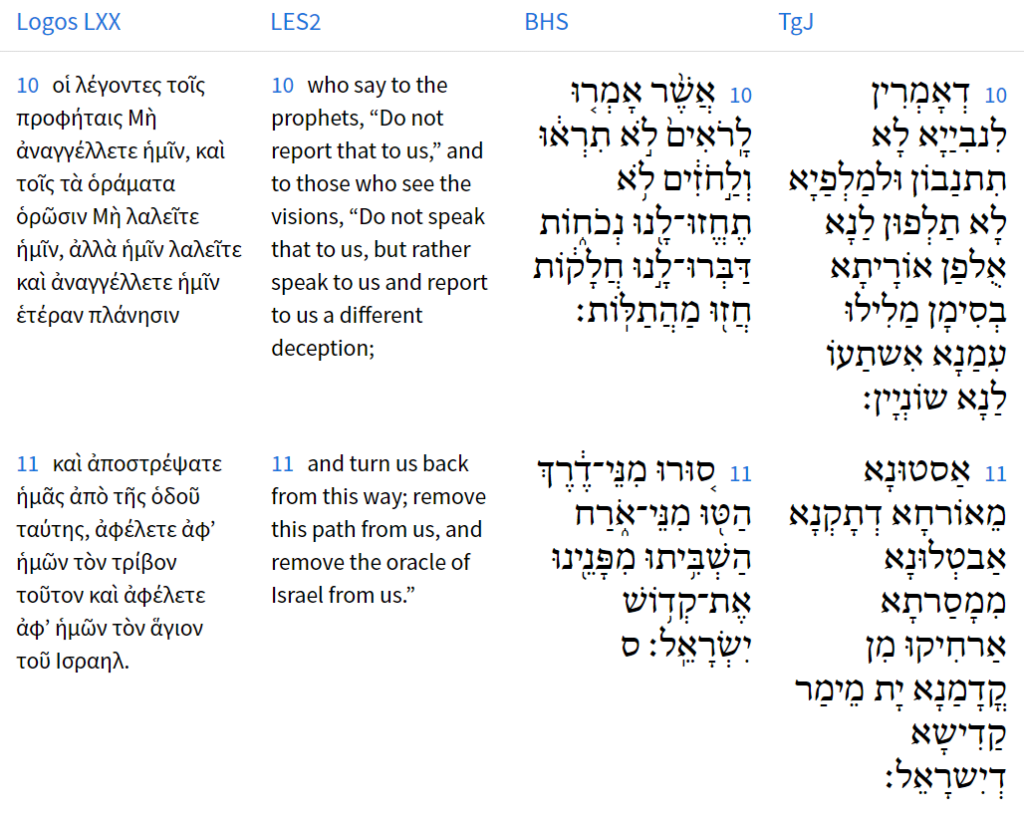
The TgJ translates saying, 10 Who say to the prophets, Prophesy ye not: and as for doctrines, teach us not the doctrine of the law: speak ye with us with signs, relate unto us various things: 11 Turn us from the right path, make us to cease from tradition; put at a distance from us the WORD of the Holy One of Israel.(TgJ) Notice how Isaiah 30:11 states that these people ask that they be turned from the correct path for the purpose of forgetting their traditions and for putting distance between them and the Word of God. This is the way Isaiah describes the people wholly turning from the Lord their God and turning to their own ways and the lusts of the world. This is the description of one who refuses to listen or hear the Word of God, and would rather listen to strange and seducing spirits that inspire the false prophets. Rebellion to God’s Word leads to deception. The rebellion is so vast that Isaiah describes the people saying סוּרוּ מִנֵּי-דֶרֶךְ הַטּוּ מִנֵּי-אֹרַח הַשְׁבִּיתוּ מִפָּנֵינוּ אֶת-קְדוֹשׁ יִשְֹרָאֵל “Get you out of the way, turn aside out of the path, cause the Holy One of Israel to cease from before us.” We note that these words are not necessarily those of the people, but that this is what their actions are actually saying. We note that behavior is very important, since we who are called to faith in the Lord do not simply provide lip service to God, but apply His Word to our lives! The point is the people Isaiah is speaking of would rather do their own thing, be comforted in their ears so that they do not have to confess their sins and repent before God. Because of their desire for the lusts of the world and for their own ways, they were blind to the truth of God’s word and were unable to hear the word of God through His prophet Isaiah.
Isaiah continues saying the following according to Isaiah 30:12.
ספר ישעיה פרק ל
יב לָכֵן כֹּה אָמַר קְדוֹשׁ יִשְֹרָאֵל יַעַן מָאָסְכֶם בַּדָּבָר הַזֶּה וַתִּבְטְחוּ בְּעֹשֶׁק וְנָלוֹז וַתִּשָּׁעֲנוּ עָלָיו:
Isaiah 30:12 states, “Wherefore thus saith the Holy One of Israel, Because ye despise this word, and trust in oppression and perverseness, and stay thereon: (לָכֵן כֹּה אָמַר קְדוֹשׁ יִשְֹרָאֵל יַעַן מָאָסְכֶם בַּדָּבָר הַזֶּה וַתִּבְטְחוּ בְּעֹשֶׁק וְנָלוֹז וַתִּשָּׁעֲנוּ עָלָיו)” Because of the leaders lust for power, their pride, and their efforts to rely upon themselves outside of relying and trusting in the Lord, Isaiah says יַעַן מָאָסְכֶם בַּדָּבָר הַזֶּה “because you despise this word,” they despise the Word of God. They are intentional in their rebellion. We remember how we as God’s people are to be intentional in our faith, actively choosing to live our lives for Him. We note that this is the same situation for those who do not believe in the God of Israel, they are intentionally choosing to not believe! This is the intentional blinding and deafening of oneself to continue in their rebellion. Isaiah says these people וַתִּבְטְחוּ בְּעֹשֶׁק וְנָלוֹז וַתִּשָּׁעֲנוּ עָלָיו “trust in oppression and crookedness and it will rest upon him” seems to lead us to the idea of politics. Today politics are filled with oppression, crookedness, and deceit! There is very little righteousness in our politicians and all of their actions are based upon a self-righteous action, such as their virtue signaling to the LGBTQ community and the woke ideologies which promote mental illness to those who accept them. Remember, for those who give themselves to these things, God will give them over to what they want for the purpose of being fully or utterly deceived! Leadership today, just as it was in Isaiah’s day, leans upon bad decisions, coercion, and deception, all of which are meant for the enrichment of the politician and to deceive the general public such that they do not function as they should, as representatives of the people! Because of these things, Isaiah continues saying the following according to Isaiah 30:13-14.
ספר ישעיה פרק ל
יג לָכֵן יִהְיֶה לָכֶם הֶעָוֹן הַזֶּה כְּפֶרֶץ נֹפֵל נִבְעֶה בְּחוֹמָה נִשְׁגָּבָה אֲשֶׁר-פִּתְאֹם לְפֶתַע יָבוֹא שִׁבְרָהּ: יד וּשְׁבָרָהּ כְּשֵׁבֶר נֵבֶל יוֹצְרִים כָּתוּת לֹא יַחְמֹל וְלֹא-יִמָּצֵא בִמְכִתָּתוֹ חֶרֶשֹ לַחְתּוֹת אֵשׁ מִיָּקוּד וְלַחְשֹף מַיִם מִגֶּבֶא:
Isaiah 30:13 states, “Therefore this iniquity shall be to you as a breach ready to fall, swelling out in a high wall, whose breaking cometh suddenly at an instant. (לָכֵן יִהְיֶה לָכֶם הֶעָוֹן הַזֶּה כְּפֶרֶץ נֹפֵל נִבְעֶה בְּחוֹמָה נִשְׁגָּבָה אֲשֶׁר-פִּתְאֹם לְפֶתַע יָבוֹא שִׁבְרָהּ)” Isaiah 30:14 “And he shall break it as the breaking of the potters’ vessel that is broken in pieces; he shall not spare: so that there shall not be found in the bursting of it a sherd to take fire from the hearth, or to take water withal out of the pit. (וּשְׁבָרָהּ כְּשֵׁבֶר נֵבֶל יוֹצְרִים כָּתוּת לֹא יַחְמֹל וְלֹא-יִמָּצֵא בִמְכִתָּתוֹ חֶרֶשֹ לַחְתּוֹת אֵשׁ מִיָּקוּד וְלַחְשֹף מַיִם מִגֶּבֶא)” These verses speak to sin (iniquity / הֶעָוֹן) as causing a breach, and of earthen vessels (clay vessels) required to be broken, this reminds us of what is written in the Torah concerning uncleanness according to Vayikra / Leviticus 11:29-36.
ספר ויקרא פרק יא
כט וְזֶה לָכֶם הַטָּמֵא בַּשֶּׁרֶץ הַשֹּׁרֵץ עַל-הָאָרֶץ הַחֹלֶד וְהָעַכְבָּר וְהַצָּב לְמִינֵהוּ: ל וְהָאֲנָקָה וְהַכֹּחַ וְהַלְּטָאָה וְהַחֹמֶט וְהַתִּנְשָׁמֶת: לא אֵלֶּה הַטְּמֵאִים לָכֶם בְּכָל-הַשָּׁרֶץ כָּל-הַנֹּגֵעַ בָּהֶם בְּמֹתָם יִטְמָא עַד-הָעָרֶב: לב וְכֹל אֲשֶׁר-יִפֹּל-עָלָיו מֵהֶם | בְּמֹתָם יִטְמָא מִכָּל-כְּלִי-עֵץ אוֹ בֶגֶד אוֹ-עוֹר אוֹ שָֹק כָּל-כְּלִי אֲשֶׁר-יֵעָשֶֹה מְלָאכָה בָּהֶם בַּמַּיִם יוּבָא וְטָמֵא עַד-הָעֶרֶב וְטָהֵר: [שביעי] לג וְכָל-כְּלִי-חֶרֶשֹ אֲשֶׁר-יִפֹּל מֵהֶם אֶל-תּוֹכוֹ כֹּל אֲשֶׁר בְּתוֹכוֹ יִטְמָא וְאֹתוֹ תִשְׁבֹּרוּ: לד מִכָּל-הָאֹכֶל אֲשֶׁר יֵאָכֵל אֲשֶׁר יָבוֹא עָלָיו מַיִם יִטְמָא וְכָל-מַשְׁקֶה אֲשֶׁר יִשָּׁתֶה בְּכָל-כְּלִי יִטְמָא: לה וְכֹל אֲשֶׁר-יִפֹּל מִנִּבְלָתָם | עָלָיו יִטְמָא תַּנּוּר וְכִירַיִם יֻתָּץ טְמֵאִים הֵם וּטְמֵאִים יִהְיוּ לָכֶם: לו אַךְ מַעְיָן וּבוֹר מִקְוֵה-מַיִם יִהְיֶה טָהוֹר וְנֹגֵעַ בְּנִבְלָתָם יִטְמָא:
Vayikra / Leviticus 11:29–36
11:29 These also shall be unclean unto you among the creeping things that creep upon the earth; the weasel, and the mouse, and the tortoise after his kind, 11:30 And the ferret, and the chameleon, and the lizard, and the snail, and the mole. 11:31 These are unclean to you among all that creep: whosoever doth touch them, when they be dead, shall be unclean until the even. 11:32 And upon whatsoever any of them, when they are dead, doth fall, it shall be unclean; whether it be any vessel of wood, or raiment, or skin, or sack, whatsoever vessel it be, wherein any work is done, it must be put into water, and it shall be unclean until the even; so it shall be cleansed. 11:33 And every earthen vessel, whereinto any of them falleth, whatsoever is in it shall be unclean; and ye shall break it. 11:34 Of all meat which may be eaten, that on which such water cometh shall be unclean: and all drink that may be drunk in every such vessel shall be unclean. 11:35 And every thing whereupon any part of their carcase falleth shall be unclean; whether it be oven, or ranges for pots, they shall be broken down: for they are unclean, and shall be unclean unto you. 11:36 Nevertheless a fountain or pit, wherein there is plenty of water, shall be clean: but that which toucheth their carcase shall be unclean. (KJV)
When we take Isaiah 30:13-14 in the context of the Torah, we see sin (iniquity / הֶעָוֹן) being paralleled to Kashrut laws. Notice how these insects and beasts which are considered unclean, if they fall upon a clay pot, the pot is to be broken. The idea here is that the likelihood of dead insects, a mouse, or lizard being found in the vessel are much higher than for bigger animals. But the point when Moshe says וְכֹל אֲשֶׁר-יִפֹּל-עָלָיו מֵהֶם | בְּמֹתָם יִטְמָא is when touching something that is dead, and so death is being connected to requiring the vessel being destroyed. This is the significance of what Isaiah is saying concerning sin (iniquity / הֶעָוֹן) which leads to death causing a breach. This is analogous to the one who has turned his or her back upon God, being estranged from Him. This life has become dead! One must repent, turn from sin, and return to the Lord and His holy ways in order for his life to be restored! One’s life must be corrected in order to avoid disaster. The disaster is the breaking and/or destruction of the vessel, our bodies or our lives! The text comparison states the following concerning these verses:
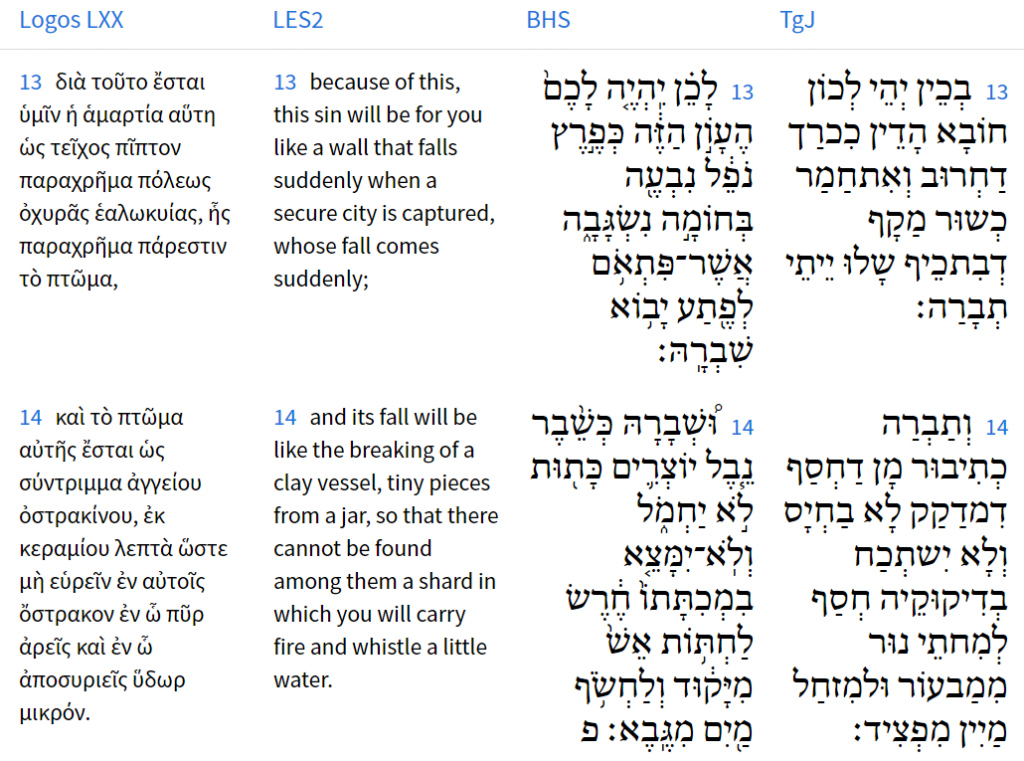
The TgJ translates saying the following, 13 Therefore this sin shall be unto you as a city laid waste, and made a ruinous heap, as a bending wall, whose breaking cometh very suddenly. 14 And its breaking shall be as the breaking of a potter’s vessel of clay, who is breaking it without compassion, and among its fragments there shall not be found a potsherd to take fire from the hearth, or to draw water from the cistern. (TgJ) Here the TgJ states explicitly that sin will be what has caused the destruction that comes if one does not repent. The laying waste of the city is being paralleled to the one who refuses to rely upon the Lord, we note that years may pass by which may cause one to believe nothing is wrong, the breach due to sin however, will eventually get bigger and bigger until it is too late. We note again What Paul writes in Romans 1, how when one gives oneself over to sin, God will then give that person wholly over to their sin for the purpose of filling up their sin until the appointed time. This is something we should pray about, asking the Lord: “please do not give us over to our sins, help us to turn from them, help us to break habitual sins which are detestable in your sight oh Lord! In Yeshua’s name! Amen!” The LXX writes, 13 διὰ τοῦτο ἔσται ὑμῖν ἡ ἁμαρτία αὕτη ὡς τεῖχος πῖπτον παραχρῆμα πόλεως ὀχυρᾶς ἑαλωκυίας, ἧς παραχρῆμα πάρεστιν τὸ πτῶμα, 14 καὶ τὸ πτῶμα αὐτῆς ἔσται ὡς σύντριμμα ἀγγείου ὀστρακίνου, ἐκ κεραμίου λεπτὰ ὥστε μὴ εὑρεῖν ἐν αὐτοῖς ὄστρακον ἐν ὧ πῦρ ἀρεῖς καὶ ἐν ὧ ἀποσυριεῖς ὕδωρ μικρόν. 13 because of this, this sin will be for you like a wall that falls suddenly when a secure city is captured, whose fall comes suddenly; 14 and its fall will be like the breaking of a clay vessel, tiny pieces from a jar, so that there cannot be found among them a shard in which you will carry fire and whistle a little water. (LES) Here the LXX emphasizes the suddenness of destruction. The point may be that we are being warned here in the Scriptures concerning our sins and not be callous to the call of God in our lives to repent. The mention of the clay pot is compared to how quickly a pot goes from being whole to being utterly destroyed. This is the extent of judgment upon the one who does not recognize the severity of sin in one’s life. The only prevention from such quick and utter destruction is to rely upon the Lord God in heaven, to trust in Him, to seek Him, to draw near to Him in Yeshua the Messiah, and to live repentant lives on a daily basis recognizing how much we have been forgiven and of being thankful for the great mercy that God shows us each day!
Rabbinic Commentary
The Targum Jonathan is an Aramaic and Rabbinic interpretation of the book of Isaiah and therefore is a very important resource for our continuing to study the book of Isaiah!
תרגום יונתן בן עוזיאל אל ישעיה פרק ל:ח-יד
ח כְעַן עֹול כְתֹוב עַל לוּחַ בֵינֵיהֹון וְעַל שִטִין דִספַר רְשֹום וּתהֵי לְיֹום דִין לְסָהְדוּ קֳדָמַי עַד עָלְמָא׃ ט אְרֵי עַם סָרְבָן אִנוּן בְנַיָא כַדָבַיָא בְנַיָא דְלָא אְבֹו לְקַבָלָא אוּלפַן אֹורָיתָא דַיוי׃ י דְאָמְרִין לִנבִיַיָא לָא תִתנַבֹון וּלמַלְפַיָא לָא תַלְפוּן לַנָא אֻלפַן אֹורָיתָא בְסִימָן מַלִילוּ עִמַנָא אִשתַעֹו לַנָא שֹונְיָין׃ יא אַסטוּנָא מֵאֹורחָא דְתָקְנָא אַבטְלוּנָא מִמָסַרתָא אַרחִיקוּ מִן קֳדָמַנָא יָת מֵימַר קַדִישָא דְיִשרָאֵל׃ יב בְכֵין כִדנָן אְמַר קַדִישָא דְיִשרָאֵל חְלָף דְקַצתוּן בְפִתגָמָא הָדֵין וְאִתרְחֵיצתוּן בְשִקרָא וּבאוּנסָא וְאִסתְמַכתוּן עְלֹוהִי׃ יג בְכֵין יְהֵי לְכֹון חֹובָא הָדֵין כִכרַך דַחְרוּב וְאִתחַמַר כְשוּר מַקָף דְבִתכֵיף שָלוּ יֵיתֵי תְבָרַה׃ יד וְתַבְרַה כְתִיבוּר מָן דַחְסַף דִמדַקַק לָא בַחְיָס וְלָא יִשתְכַח בְדִיקוּקֵיה חְסַף לְמִחתֵי נוּר מִמַבעֹור וּלמִזחַל מַיִין מִפְצִיד׃
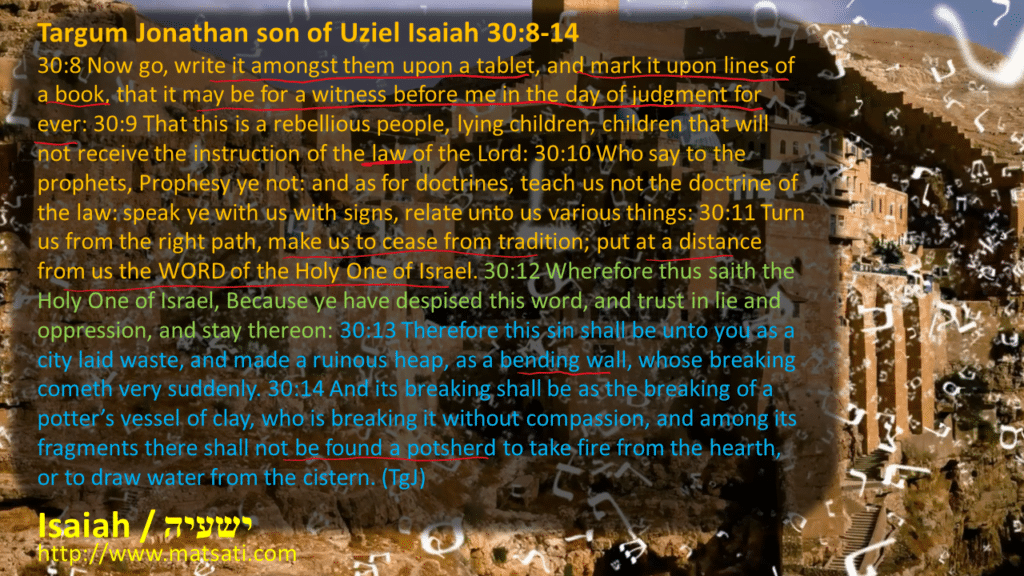
Targum Jonathan son of Uziel Isaiah 30:8-14
30:8 Now go, write it amongst them upon a tablet, and mark it upon lines of a book, that it may be for a witness before me in the day of judgment for ever: 30:9 That this is a rebellious people, lying children, children that will not receive the instruction of the law of the Lord: 30:10 Who say to the prophets, Prophesy ye not: and as for doctrines, teach us not the doctrine of the law: speak ye with us with signs, relate unto us various things: 30:11 Turn us from the right path, make us to cease from tradition; put at a distance from us the WORD of the Holy One of Israel. 30:12 Wherefore thus saith the Holy One of Israel, Because ye have despised this word, and trust in lie and oppression, and stay thereon: 30:13 Therefore this sin shall be unto you as a city laid waste, and made a ruinous heap, as a bending wall, whose breaking cometh very suddenly. 30:14 And its breaking shall be as the breaking of a potter’s vessel of clay, who is breaking it without compassion, and among its fragments there shall not be found a potsherd to take fire from the hearth, or to draw water from the cistern. (TgJ)
The TgJ translates saying that the words of the testimony of the witness of judgment is to be written down so that it will testify of these rebellious people. Rashi writes in his commentary (Rashi on Isaiah 30:8 Part 1) “engrave it (חֻקָּהּ) engrave it, this prophecy” speaking to the word of God will continue and be preserved for a witness for each of us and for everyone. The TgJ states the following: ח כְעַן עֹול כְתֹוב עַל לוּחַ בֵינֵיהֹון וְעַל שִטִין דִספַר רְשֹום וּתהֵי לְיֹום דִין לְסָהְדוּ קֳדָמַי עַד עָלְמָא׃ 30:8 Now go, write it amongst them upon a tablet, and mark it upon lines of a book, that it may be for a witness before me in the day of judgment for ever: ט אְרֵי עַם סָרְבָן אִנוּן בְנַיָא כַדָבַיָא בְנַיָא דְלָא אְבֹו לְקַבָלָא אוּלפַן אֹורָיתָא דַיוי׃ 30:9 That this is a rebellious people, lying children, children that will not receive the instruction of the law of the Lord: י דְאָמְרִין לִנבִיַיָא לָא תִתנַבֹון וּלמַלְפַיָא לָא תַלְפוּן לַנָא אֻלפַן אֹורָיתָא בְסִימָן מַלִילוּ עִמַנָא אִשתַעֹו לַנָא שֹונְיָין׃ 30:10 Who say to the prophets, Prophesy ye not: and as for doctrines, teach us not the doctrine of the law: speak ye with us with signs, relate unto us various things: יא אַסטוּנָא מֵאֹורחָא דְתָקְנָא אַבטְלוּנָא מִמָסַרתָא אַרחִיקוּ מִן קֳדָמַנָא יָת מֵימַר קַדִישָא דְיִשרָאֵל׃ 30:11 Turn us from the right path, make us to cease from tradition; put at a distance from us the WORD of the Holy One of Israel. (TgJ) Here Isaiah says that the people who are rebellious are those who reject the Torah of God. The major point of these verses from the TgJ is that the Tanakh (תנ’’ך) is relevant for us today in regard to doctrine and truth. I have talked to people however who believe that the OT is virtually irrelevant today saying that doctrine and truth is found only in the NT text, and this is sufficient for us. When trying to talk with such people, it is like running into a wall, just as Isaiah says in Isaiah 30:9 that they refuse to receive the instruction of the law of the Lord. We notice something very important according to the NT text concerning Yeshua’s words on this topic. Yeshua said that he did not come to abolish the Torah or the Prophets, but to fulfill them (Matthew 5:17-19). He later said in Matthew 19:17 “if you would enter life, keep the commandments.” When he was further asked about which commandments were most important, he cited the Ten commandments and appealed to the man to follow them (see Matthew 19:18-21). In addition to this, He said that the Scriptures testify of Him (John 5:39) and that as the followers of Yeshua we should strive to understand what this means and how the Scriptures testify of Him. It is unfortunate that so many feel this is not an important task for us today to understand what the scriptures say about Yeshua from the תנ’’ך. Ibn Ezra and Rashi both say the following concerning Isaiah 30:11 regarding the people asking to be turned from their tradition and to be distanced from the Word of God.
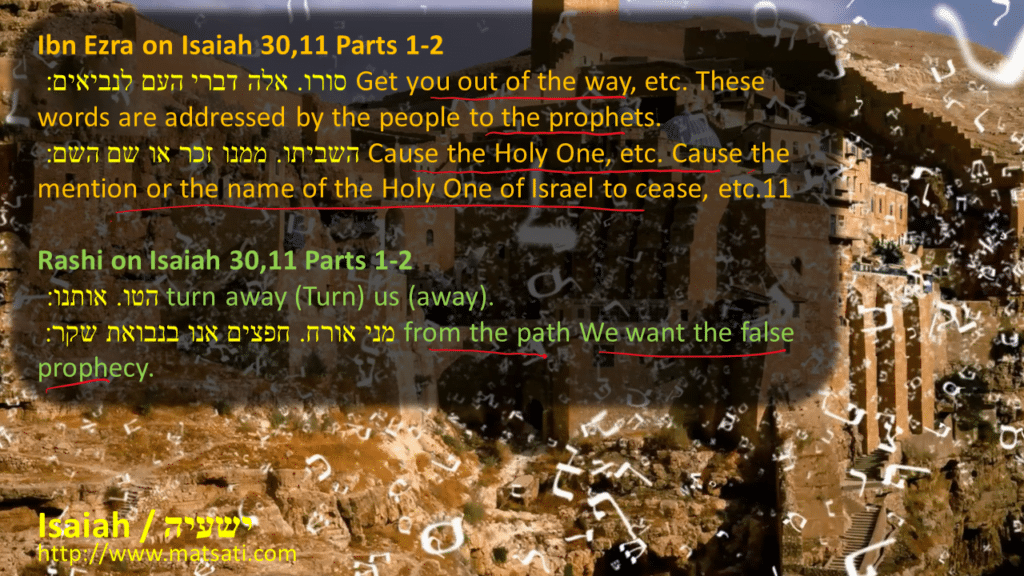
Ibn Ezra on Isaiah 30,11 Parts 1-2
סורו. אלה דברי העם לנביאים: Get you out of the way, etc. These words are addressed by the people to the prophets.
השביתו. ממנו זכר או שם השם: Cause the Holy One, etc. Cause the mention or the name of the Holy One of Israel to cease, etc.11
Rashi on Isaiah 30,11 Parts 1-2
הטו. אותנו: turn away (Turn) us (away).
מני אורח. חפצים אנו בנבואת שקר: from the path We want the false prophecy.
Ibn Ezra states that these words from Isaiah are the people’s words to the prophets, and the outcome of this approach to faith is to cause the mention of the Name of God to cease in Israel. Rashi agrees saying that turning us away is synonymous to asking to hear false prophecy as opposed to the truth. We note how this is the approach of those who reject Yeshua as the Messiah of God, and who also reject His words which he speaks saying, John 5:39 Search the scriptures; for in them ye think ye have eternal life: and they are they which testify of me. (KJV) Again, Yeshua said they testify of Him, and if this is so, we should press hard to understand how this is so searching these things out. The anti-missionary however on the other hand chooses the presupposition that the Tanakh (תנ’’ך) does not speak of Yeshua and then fixes his attention only on the Peshat method of interpretation in his attempts to justify his presupposition. When we study the Torah and apply it to our lives, we are able to more fully appreciate the mercy and grace of God in sending His Son Yeshua to lay his life down for ours. We also more fully appreciate the sacrificial system and how Yeshua functions as our Kohen Gadol (High Priest). We are told in Luke 24:13-36 that Yeshua explained the scriptures to his disciples and their hearts burned over the things that had just happened, Yeshua giving his life for theirs, and the resurrection. We also note that faith and service did not change following faith in Yeshua, we are told in the book of Acts that the disciples regularly met at the Temple in Jerusalem (Acts 2:46) and how both John and Peter were testifying at the Temple during prayer time (Acts 3:1) and how there were thousands who believed and were zealous for the Torah (see Acts 21:20). In addition, the disciples were imprisoned, and an angel of God freed them and told them to “go, stand and speak in the Temple to the people all the words of this life.” (See Acts 5:20) We also note how Paul took a Nazarite vow (Acts 18:18), he lived a Torah observant life (Acts 21:23-24), and offered sacrifices in the Temple (Acts 21:26) and if we study the sacrifices for conclusion of a Nazarite vow, these sacrifices included a whole burnt offering, a sin offering, and a grain offering, etc. Note there are many more examples like this in the NT text, but from these short examples we can easily see the relevance of the Torah in our lives today! There are those however who profess the authority of both the Tanakh (תנ’’ך, OT) and the NT text, while functionally relegating the study of the Torah to the dustheap of history. This is why there are those who learn about Torah-Judaism and then turn from their faith in Yeshua because they do not have a solid foundation and education in the תנ’’ך and the original languages. We note the outcome here of this approach, Isaiah explains it according to the TgJ saying, יב בְכֵין כִדנָן אְמַר קַדִישָא דְיִשרָאֵל חְלָף דְקַצתוּן בְפִתגָמָא הָדֵין וְאִתרְחֵיצתוּן בְשִקרָא וּבאוּנסָא וְאִסתְמַכתוּן עְלֹוהִי׃ 30:12 Wherefore thus saith the Holy One of Israel, Because ye have despised this word, and trust in lie and oppression, and stay thereon: (TgJ) Here the idea is that one despises the Word of God. This is analogous to believing in the irrelevance of the Torah for our lives today in the modern theologies of this present day. Notice how despising the Word is synonymous to trusting in a lie, and then oppression follows and one “staying thereon” meaning that one is placed into a secure position in their hearts becoming hard or callus to the truth. This is a very dangerous place to be! To turn from Yeshua is to turn from the truth, the evil one does not come all at once to cause someone to fall away from faith in Yeshua. He comes in subtle stages, little by little. This is why our study of the Scriptures needs to be of the highest priority since the scriptures are food for our spirit, and help us to keep in memory the mercy of God and His Son Yeshua. The word of God also functions as a wall of protection for God’s people!
The commentator Likutei Moharan writes the following concerning Isaiah 30:12 and 30:14.
Likutei Moharan 60,8 Part 7
This is why we break an earthen dish, in the aspect of “and you put your trust in fraud and corruption… It is shattered as [one shatters] a potter’s jug… so that no earthen shard is left in its breakage…” (Isaiah 30:12, 14). The trust of holiness created by the engagement, as explained above, is the opposite of the trust of the Other Side, which is in the aspect of breaking an earthen dish, as explained above. In addition, we hint to [the couple] that if they fail to conduct themselves in holiness and betray the aspect of trust/procreation, God forbid, then they will be in the aspect of breaking an earthen dish, which is caused by “the trust of the unfaithful” (Proverbs 25:19), as explained above.
Here the Rabbis connect the trusting in fraud and corruption to that of breaking an earthen vessel. We note that when fraud and corruption prevail then something useful has been broken. Just like our governmental system today, when the politicians are corrupt, they no longer are representative of the people and the system becomes broken. God wants us to be faithful as opposed to being unfaithful. The broken vessel has no utility, it cannot hold anything because it is broken, and this refers to the one who is unfaithful. The Rabbis compare this to a wedding covenant and quote from Mishley / Proverbs 25:19 saying, “Confidence in an unfaithful man in time of trouble, Is like a broken tooth, and a foot out of joint.” We can really see the application of this word for us today in our modern world! Solomon’s comparison draws in the context of the tooth and foot and there being much pain associated with these things in relation to the one who is unfaithful. Isaiah goes on to describe what happens to those who are unfaithful how it leads to destruction in Isaiah 30:13-14, יג בְכֵין יְהֵי לְכֹון חֹובָא הָדֵין כִכרַך דַחְרוּב וְאִתחַמַר כְשוּר מַקָף דְבִתכֵיף שָלוּ יֵיתֵי תְבָרַה׃ 30:13 Therefore this sin shall be unto you as a city laid waste, and made a ruinous heap, as a bending wall, whose breaking cometh very suddenly. יד וְתַבְרַה כְתִיבוּר מָן דַחְסַף דִמדַקַק לָא בַחְיָס וְלָא יִשתְכַח בְדִיקוּקֵיה חְסַף לְמִחתֵי נוּר מִמַבעֹור וּלמִזחַל מַיִין מִפְצִיד׃30:14 And its breaking shall be as the breaking of a potter’s vessel of clay, who is breaking it without compassion, and among its fragments there shall not be found a potsherd to take fire from the hearth, or to draw water from the cistern. (TgJ) The idea of breaking a pot, the TgJ draws out that when a pot is broken there are some pieces that may remain useful. For example, when a piece is large enough to be used as a shovel or scoop to shift or lift coals from a fire or to be used as a cup to draw water from a river. Here the outcome of turning from God’s word and from faith, the idea is that the pieces are so small there is absolutely no use for them outside of being tossed upon a waste dump. Ibn Ezra and Rashi both describe these things in relation to the walls of the city saying the following:
Ibn Ezra on Isaiah 30,13 Parts 1-3
לכן. טע’ ותבטחו בממון שתתנו למלך אשור ולא יבוא, העון הזה, ישחתכם: Therefore,15לכן, in the Hebrew original, is not part of the explanation, but the first word of the next verse, which is to be explained. because you trust in the money, which you send to the King of Assyria, that he shall not come.16Comp. 2 Kings 18:15, 16. This iniquity shall be to you, etc., that is, it will destroy you.
כפרץ [נפל נבעה]. כמגדל נופל או דבר נבעה, והוא מטעם נפוח מגזרת אבעבועות (שמות ט’ ט’) או יהיה נבעה תואר פרץ: כפרץ מגדל נופל ═ נופל כפרץ As a breach of a falling tower.17A. V., As a breach ready to fall, swelling out.17A. V., As a breach ready to fall, swelling out. דבר נבעה ═ נבעה A swelling thing. Of the same root is אבעבועות blains (Exod. 9:9). נבעה can also be joined with פרץ: a swelling breach.
פתע גם פתאום קרובים. כטעם אדמת עפר: לפתע פתאם Suddenly at an instant. The two words have nearly the same meaning; comp. אדמת עפר the dust of the earth (Dan. 12:12).18This construction, the combination of two similar nouns, the one in the genitive governed by the other, is met with more frequently than I. E. seems to suppose. It expresses a kind of superlative, e. g., קדש הקדשים the most holy; so also לפתע פתאם most suddenly.
Rashi on Isaiah 30,13 Parts 1-2
כפרץ. של חומה שנפל: as a breach of a fallen wall.
נבעה בחומה נשגבה. מגולה ליכנס בה בחומות משגבכם נבעה לשון גלוי כמו בעובדיה (א ו) נבעו מצפוניו אתגליין מטמרוהי, ודונש פתר נבעה בליטה שהחומה נעשית כמין אבעבועות מפני הגשמים וקילקול טיט רעוע: revealed in a fortified wall Revealed to enter thereby the walls of your fortification. נִבְעֶה is an expression of revealing, as in Obadiah (1:6): “His hidden things were revealed (נִבְעוּ).” Dunash, however, interprets נִבְעֶה as a protrusion, since the wall develops blisters (אֲבַעְבּוּעוֹת) because of the rains and the deterioration of the weak mortar.
Ibn Ezra describes the walls of the city of the unfaithful as bulging out. This means that there is weakness in the wall which allows the earth behind the wall to burst forth, or simply the weight of the wall pressing down upon the weak spot leads to it bulging out or swelling. Iniquity has this quality, to form a weak spot where the enemy may attack. This is why the analogy of the breached wall is such a good example. Rashi describes the walls of fortification, and it is interesting how the Word of God functions as a wall of fortification for us. When one walks away from the truth of God the enemy uses this as a point for attack and for deception. The idolatry of self, material things, immorality, and pride are the paths of attack the evil one uses to keep one in bondage. The Lord God and His Messiah want freedom for our lives. This is why Midrash Tanchuman Buber says what it does concerning these verses from Isaiah.
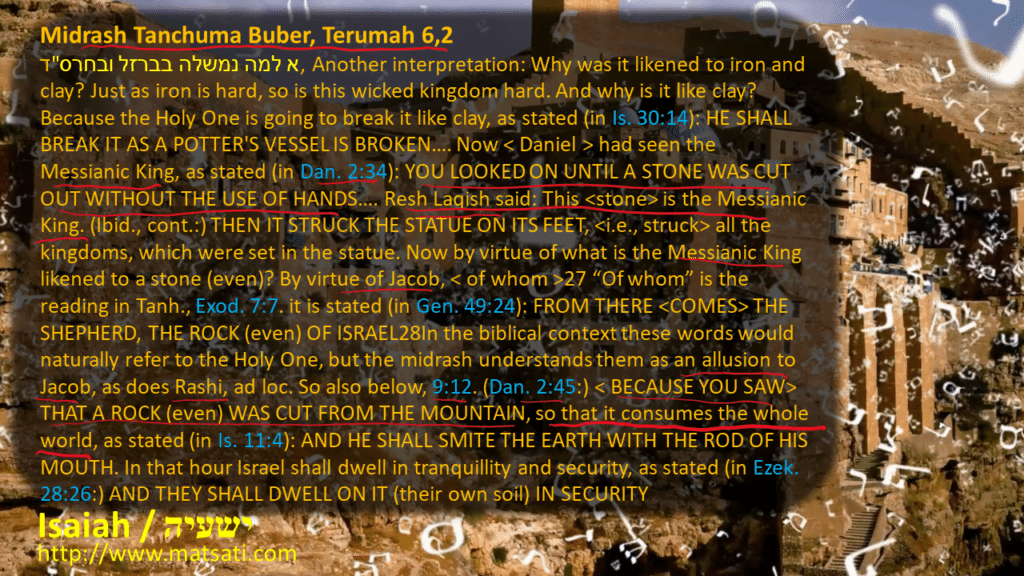
Midrash Tanchuma Buber, Terumah 6,2
ד”א למה נמשלה בברזל ובחרס, אלא מה הברזל קשה כך המלכות הרשעה הזו קשה, ובחרס למה שעתיד הקב”ה לשברה כחרס, שנאמר ושברה כשבר נבל יוצרים וגו’ (ישעיה ל יד), וראה מלך המשיח, שנאמר חזה הוית עד די התגזרת אבן וגו’ (דניאל ב לד), אמר ריש לקיש זו מלך המשיח, ומחת לצלמא על רגלוהי (שם), לכל המלכיות שהן נתונות בצלם, ובזכות מה נמשל מלך המשיח באבן, בזכות יעקב, שנאמר משם רועה אבן ישראל (בראשית מט כד), די מטורא אתגזרת אבן (דניאל שם מה), שוא מכלה את העולם כולו, שנאמר והכה ארץ בשבט פיו (ישעיה יא ד), באותה שעה ישראל יושבין בהשקט ובטח, שנאמר וישבו עליה לבטח (יחזקאל כח כו). Another interpretation: Why was it likened to iron and clay? Just as iron is hard, so is this wicked kingdom hard. And why is it like clay? Because the Holy One is going to break it like clay, as stated (in Is. 30:14): HE SHALL BREAK IT AS A POTTER’S VESSEL IS BROKEN…. Now < Daniel > had seen the Messianic King, as stated (in Dan. 2:34): YOU LOOKED ON UNTIL A STONE WAS CUT OUT WITHOUT THE USE OF HANDS…. Resh Laqish said: This <stone> is the Messianic King. (Ibid., cont.:) THEN IT STRUCK THE STATUE ON ITS FEET, <i.e., struck> all the kingdoms, which were set in the statue. Now by virtue of what is the Messianic King likened to a stone (even)? By virtue of Jacob, < of whom >27“Of whom” is the reading in Tanh., Exod. 7:7. it is stated (in Gen. 49:24): FROM THERE <COMES> THE SHEPHERD, THE ROCK (even) OF ISRAEL28In the biblical context these words would naturally refer to the Holy One, but the midrash understands them as an allusion to Jacob, as does Rashi, ad loc. So also below, 9:12. (Dan. 2:45:) < BECAUSE YOU SAW> THAT A ROCK (even) WAS CUT FROM THE MOUNTAIN, so that it consumes the whole world, as stated (in Is. 11:4): AND HE SHALL SMITE THE EARTH WITH THE ROD OF HIS MOUTH. In that hour Israel shall dwell in tranquillity and security, as stated (in Ezek. 28:26:) AND THEY SHALL DWELL ON IT (their own soil) IN SECURITY.
The Rabbis describe this nation as both iron and clay. The sense of iron is of being wicked and hard, unwilling to listen, unwilling to repent, and unwilling to be humble. The clay pot is analogous to the ease in which God will destroy those who live like this. The rabbis draw in the Messianic King according to Daniel 2:34 where the Midrash interprets the stone that was cut out without the use of hands as a reference to the Messiah. They draw this into Daniel’s vision of the statue that was composed of both stone and clay. The stone that smashed the feet is a reference to the Messiah of God setting people and nations free. The Midrash explains why the Messiah is likened to a stone, and the explanation brings us back to the Torah, to Jacob and Bereshit / Genesis 49:24 reference to “the Shepherd the Rock of Israel” where the Torah context was to the Holy One, God! What we see here is how the Messiah strikes the foundation of idolatry, in which it is said all of the nations are set in the idol or having their root in idolatry. The concept here is to the Lord setting us free from the sins of the nations and from sin that is rooted in idolatry, bondage, and hatred. This is the power of the Messiah of God to bring peace, and these things are consistent with the NT descriptions of Yeshua HaNetzaret. When we read through the Scriptures, the most significant thing that God does is not the working of an external miracle, but of the Lord working in the lives of His people! The Lord God works internal miracles every day to set His people free from sin and bondage! This means that when we have the desire to turn from sin, to repent, and to seek the forgiveness of God, and to walk in His holy ways, this is a miracle of God in our hearts! This is the kind of miracle we should be looking for every day!
